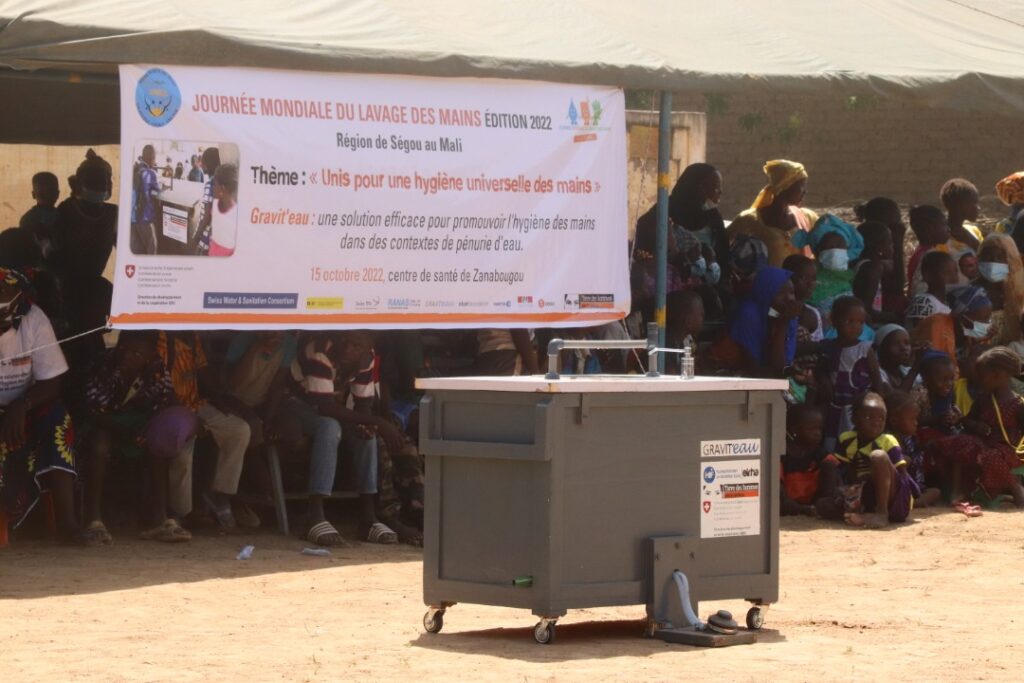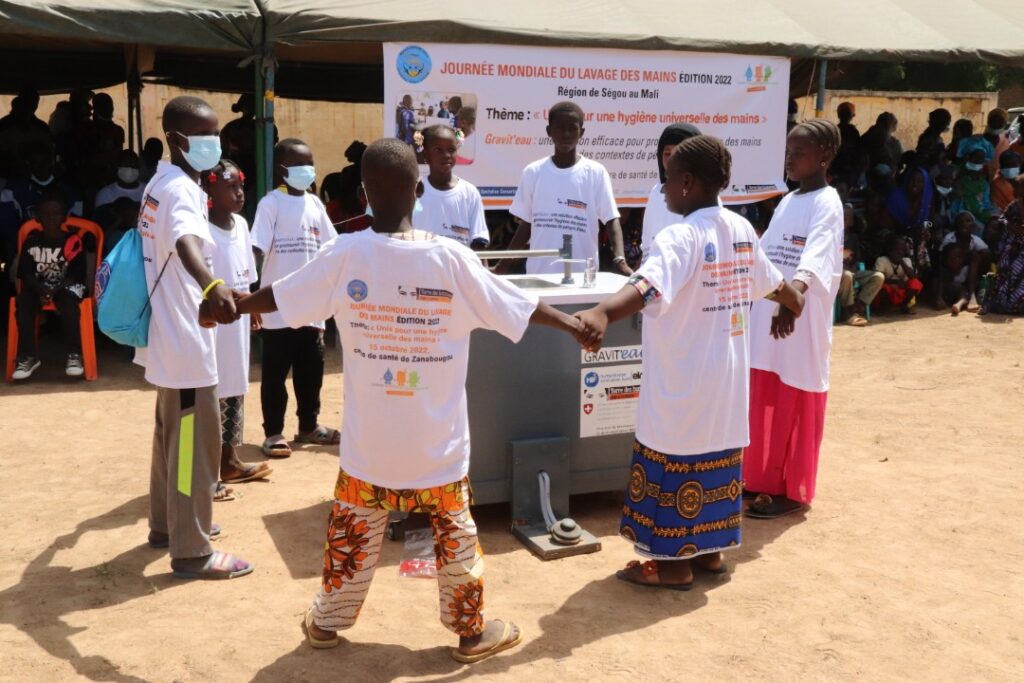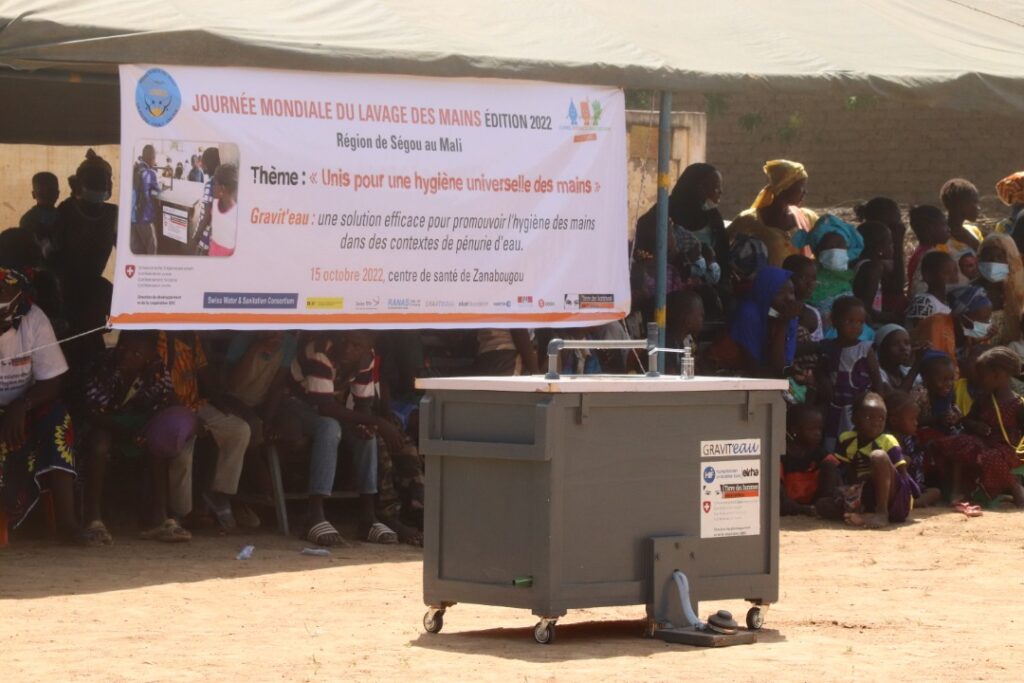27. October 2022
(English version below)
Auteur et crédits photos: Tdh Mali
Le projet SWSC mis en œuvre au Mali développe une approche holistique de l’hygiène des mains, de la qualité de l’eau dans les centres de santé. Ce projet mis en œuvre dans la région de Ségou, bénéficie des soutiens financiers de la Direction du Développement et de la Coopération Suisse.
Le thème de la journée mondiale du lavage des mains choisi par l’OMS cette année, “S’unir pour l’hygiène des mains universelle”. Pour marquer l’évènement, Terre des hommes (Tdh), en collaboration avec le Ministère de la Santé et du Développement Social, représenté par la Direction Nationale de Santé de Ségou, a organisé une cérémonie le 15 octobre au Centre de Santé Communautaire (CScom) de Zanabougou, région de Ségou, Mali, à laquelle ont participé : le préfet, le maire, le chef de village et l’ensemble des acteurs du secteurs de la société civile.

A travers cette journée, Tdh souhaite promouvoir et soutenir une culture universelle du lavage des mains dans la région de Ségou au Mali à travers le projet d’innovation hands4health centré sur la station de lavage des mains innovante “Gravit’eau : une solution efficace pour promouvoir l’hygiène des mains”. De manière plus spécifique, la célébration de cette journée avait pour objectifs :
- Plaider/ sensibiliser les communautés et les autorités sanitaires et politiques sur l’importance du lavage des mains au savon afin de susciter un effort collectif pour un changement de comportement durable en faveur du lavage des mains dans les communautés et les institutions.
- Sensibiliser les agents de santé, les communautés et les enfants sur l’importance du lavage des mains au savon afin qu’ils soient des vecteurs de changement dans les communautés.
- Communiquer sur le projet SWSC, notamment la méthodologie Wash FIT comme solution pour favoriser durablement le lavage des mains, la prévention et contrôle des infections surtout dans les contextes à pénurie d’eau.
Des jeux concours, des sketchs démonstratifs et d’autres activités ludiques et éducatives ont permis à près de 300 participants d’en apprendre davantage sur l’importance de l’hygiène des mains et de déclencher un changement de comportement durable. Par ailleurs, le projet a également sensibilisé près de 100 000 personnes à l’importance du lavage des mains au savon à travers des communications à la radio et sur les réseaux sociaux.

Global Handwashing Day Celebration
Author and photo credits: Tdh Mali
The SWSC project in Mali is developing a holistic approach to hand hygiene and water quality in health centres. This project, which is being implemented in the Segou region, receives financial support from the Swiss Agency for Development and Cooperation.
In 2022, the theme of Global Handwashing Day chosen by the WHO was “Unite for Universal Handwashing”. To mark the event, Terre des hommes (Tdh), in collaboration with the Ministry of Health and Social Development, represented by the National Health Directorate of Segou, organised a ceremony on 15th October at the Community Health Centre of Zanabougou, Segou region, Mali, in which the prefect, the mayor, the village chief and all the actors of the civil society sector participated.

Through this day, Tdh wishes to promote and support a universal handwashing culture in the Segou region of Mali through the hands4health innovation project centred on the innovative handwashing station “Gravit’eau an effective solution to promote hand hygiene”. More specifically, the celebration of this day had the following objectives
- Advocate/sensitize communities and health and political authorities on the importance of handwashing with soap in order to create a collective effort for sustainable behaviour change towards handwashing in communities and institutions.
- Sensitise health workers, communities and children on the importance of handwashing with soap so that they can be agents of change in their communities.
- Communicate on the SWSC project, in particular the WASH FIT methodology as a solution to promote sustainable handwashing, infection prevention and control, especially in water-scarce contexts.
Through competitions, demonstration skits and other fun and educational activities, nearly 300 participants learned about the importance of hand hygiene and triggered sustainable behaviour change. In addition, the project also raised awareness of the importance of handwashing with soap among nearly 100,000 people through radio and social media communications.
